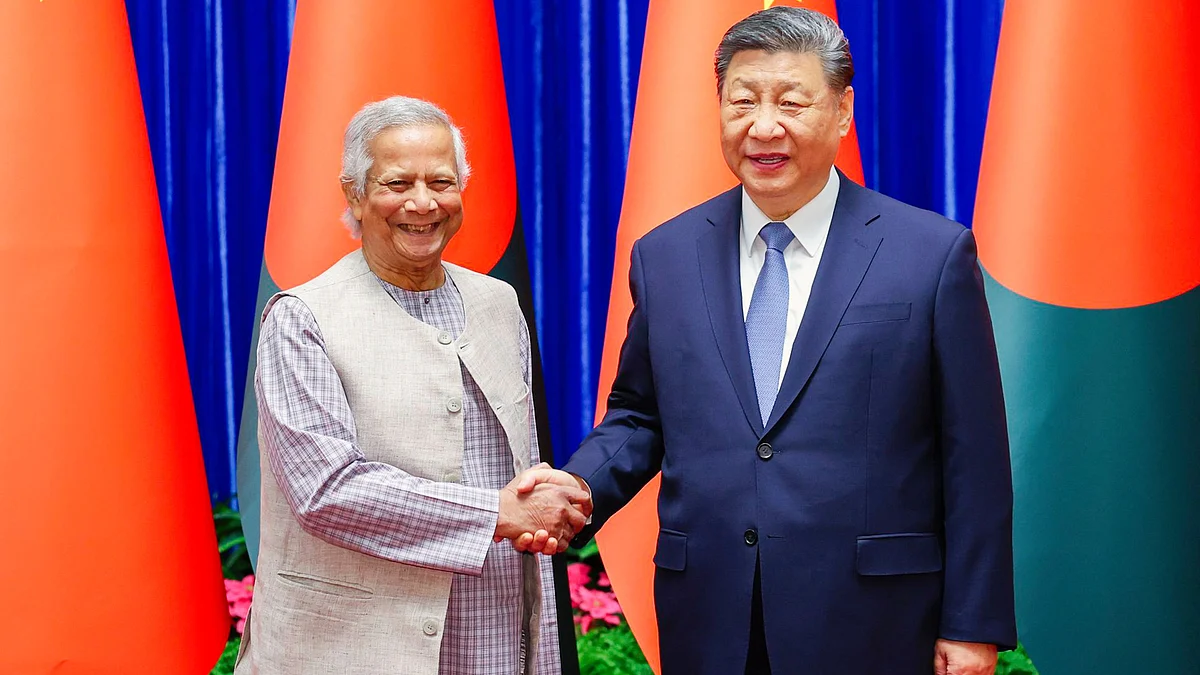Bangladesh moves closer to China while India waits and watches
Reports say Bangladesh invited Chinese companies to participate in Teesta river project and there will be Chittagong-Kunming flights soon

Bangladesh is learned to have sought a meeting between the Indian prime minister and Muhammad Yunus, chief adviser to the interim government in Dhaka, on the sidelines of the sixth BIMSTEC (Bay of Bengal Initiative for Multi-Sectoral Technical and Economic Cooperation) summit in Thailand beginning Thursday, 3 April. While New Delhi is yet to confirm if the two leaders will indeed meet, such a meeting may help paper over differences and misgivings in both countries.
Indian media only woke up on 1 April to the four-day visit to China by Yunus that ended on 29 March, and highlighted a portion of his address that several politicians in India have been quick to find objectionable.
While wooing investors in China, Yunus drew their attention to the fact that India’s North-Eastern states, the seven sisters, are landlocked and their nearest access to the sea is in Bangladesh. Bhutan and Nepal too are landlocked while the sea is in Bangladesh's backyard, which is the ‘guardian of the ocean’ in the region, Yunus said rhetorically.
Political leaders in India, especially those from Assam and Tripura, have been quick to take offence and say they are not amused. Assam chief minister Himanta Biswa Sarma condemned the statement.
“Bangladesh is inviting China to encircle India. This attitude of the Bangladesh government is very dangerous for the security of our North-East region,” Congress leader Pawan Khera posted in Hindi on X. The government is not taking care of Manipur, and China has already settled villages in Arunachal."
In Tripura, a belligerent Tipra Motha Party chief Pradyot Manikya suggested, "Rather than spending billions on innovative and challenging engineering ideas, we might as well break up Bangladesh and have our own access to the sea."
The North-Eastern states of Assam, Arunachal Pradesh, Manipur, Meghalaya, Nagaland, Mizoram, Tripura and Sikkim collectively have a 1,596 km-long international border with Bangladesh and 1,395 km with China, but are only connected with the rest of India through a narrow 22-km strip of land called the ‘chicken’s neck’ corridor, restricting road and rail connectivity. It is in this context that the statement by Yunus is being seen.
“Seven states of India, eastern part of India, called seven sisters… they are landlocked country, landlocked region of India…they have no way to reach out to the ocean…we are the only guardian of the ocean for all this region. So, this opens up a huge possibility. So, this could be an extension of the Chinese economy. Build things, produce things, market things, bring things to China, bring it out to the whole rest of the world,” he said.
Kolkata, which was the preferred destination for Bangladeshis seeking medical treatment, too would be looking anxiously to medical tourism shifting to south China.
Four hospitals in Kunming, 1,700 km by road from Chittagong, have been set aside by China for the treatment of patients from Bangladesh, reported both the Dhaka Tribune and Daily Star. New flights between Kunming and Chittagong to be launched in April will reduce travel costs and time, making it easier for more Bangladeshis to access healthcare in China, reported the two newspapers.
In March 2025, a group of Bangladeshis travelled to Kunming for treatment for the first time; while praising the quality of the hospitals, many expressed concerns over high travel costs. In April, Bangladesh plans to send a large team of journalists to Kunming to observe the treatment facilities firsthand.
China has been Bangladesh's largest trading partner for 15 consecutive years, Yunus pointed out, and claimed that there are nearly 1,000 Chinese enterprises operating in Bangladesh. "Bangladesh's imports from China are increasing. The bulk of our industrial-use products come from China," he was quoted as saying. He noted that Bangladesh oversees the entire Bay of Bengal, providing significant access to global markets through this strategic waterway. "So, Bangladesh is your gateway not only for Bangladesh itself but for three other major regions. You can leverage the advantages of doing business in this entire region through Bangladesh,” he added.
The two countries also announced the signing of a commercial agreement for the modernisation and expansion of Mongla port, the building of a robot physiotherapy and rehabilitation centre, and the donation of a cardiac surgery vehicle.
Follow us on: Facebook, Twitter, Google News, Instagram
Join our official telegram channel (@nationalherald) and stay updated with the latest headlines
